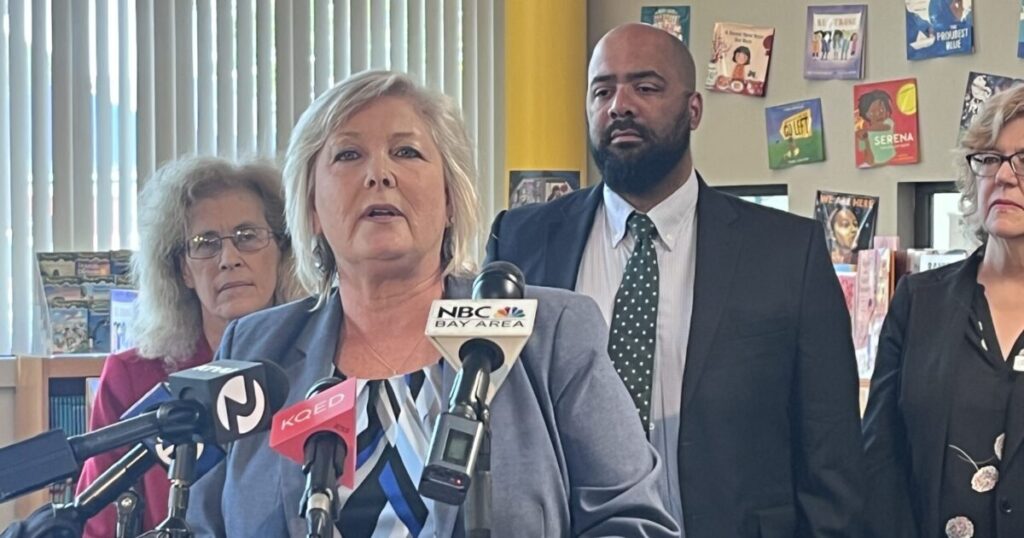Silicon Valley school district educators and politicians are emphasizing how federal funding cuts will hurt vulnerable students and lead to a loss of teachers.
Congressmember Sam Liccardo, Democratic Whip Katherine Clark and Campbell Union School District Superintendent Shelly Viramontez spoke out at Rosemary Elementary School April 23 against proposed funding cuts to special education and Title I funding to school districts with high percentages of low-income students. Liccardo and congressional Democrats are challenging the executive order to eliminate the U.S. Department of Education and a proposed $330 billion in cuts to key educational programs over the next 10 years.
“Rosemary Elementary has a very effective program for special needs students,” Liccardo told San José Spotlight. “Pulling the rug out on this kind of opportunity for children is just criminal.”
Viramontez said the loss of federal funds would affect the district’s general budget as about 9% comes from the federal government, including $830,000 from Title I. At Rosemary Elementary School, about 34% of the budget comes from federal dollars, aiding English language learner students and students with disabilities. Students with disabilities make up 9% of the student population and 81% are socioeconomically disadvantaged.
“It’s impacting our most marginalized students the most,” Viramontez told San José Spotlight. “Our special education budget is $26 million right now, so that would have a pretty significant impact on us.”

Viramontez said the district provides a preventative, supportive, whole child approach.
“We don’t have enough funding as it is,” she said. The idea of losing what we currently have … we can’t tolerate that. We can either invest wisely in developing the students so they have skills to be productive, contributing citizens or we can deprive that system and then … we’re going to have to pay in a big way on the back end.”
Clark said in addition to funding cuts to Head Start, Title I and school nutrition programs are threatened due to their sizable budgets.
“This is a school that is heavily reliant on Title 1 funding,” Clark said. “These dollars work. At Rosemary Elementary School, they serve 15,000 meals a month. The difference that can make in a child’s life … in a family’s budget. We should be adding more funding … not taking it away.”
Alyssa Sigala, a kindergarten teacher at Rosemary Elementary School, said the loss of federal funding could mean losing reading specialists, instructional aides and special education staff who support children with learning disabilities and provide behavioral support and speech services.
David Goldberg, president of the California Teachers Association, said cuts to Department of Education programs affect 800,000 special education students statewide, hundreds of thousands of students who rely on free lunch programs and $2.1 billion in Title I grants. California receives about $16.3 billion in federal funding, including $1.33 billion for students with disabilities, according to the teachers association.
“It is a tidal wave. It’s a whole ecosystem of programs,” he told San José Spotlight. “Kids are going to come to school hungry. Special ed students are not going to get the services they need.”
Goldberg said the threatened loss of $600 million in federal teaching training grants and other financial help for teacher candidates could cause a shortage.
“It’s going to be harder and harder to fill positions if you cut these programs that are targeted to bring people into a profession that is already underpaid,” he said. “We’re going to continue to push on the federal government to stop creating … this constant threat of cuts that is just devastating public education. It leads to people leaving this profession.”
Contact Lorraine Gabbert at [email protected].



